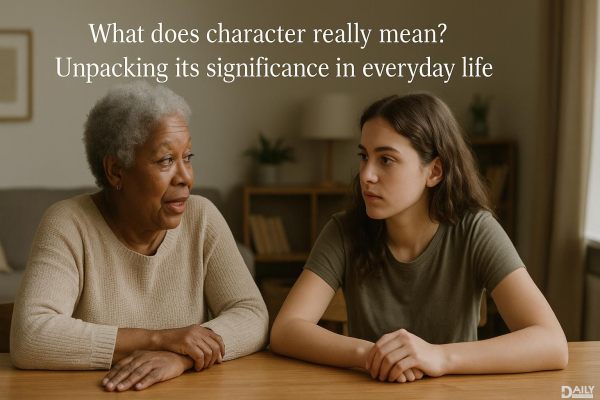High school was a long time ago, but I've never forgotten the time I was deceived by someone I considered a friend. One morning, she came over to my locker to complain about a mutual friend. And being the less evolved person than I am now, I couldn't resist the opportunity to gossip. So, I was surprised when the friend we were gossiping about later confronted me.
My gossip partner had made it seem like I was being a shitty friend and she was just an innocent bystander. That's when I realized I was dealing with a traitor, not unlike the contestants on "The Traitors." The show is about a group of contestants who are sequestered in a castle; three are designated as "traitors" whose identity is known to viewers and each other. The remaining contestants are called "faithfuls" and their goal is to unmask and banish the traitors while avoiding eliminations and vying for their share of a cash prize.
In light of the show's growing popularity, you might be wondering if you could recognize a traitor from a faithful in your own life. In my case, I gossiped behind a friend's back and was then double-crossed by my gossip partner who revealed what I had told her in confidence. Take it from me: it's hard to know where we stand with our friends and why we gossip, despite how harmful it is.
Below, relationship experts explain when gossip crosses the line from harmless chitchat to malicious behavior — and how to restore trust when it's broken.
The Psychology Behind Gossip
Gossip is when you exchange personal information about someone who isn't present. Maybe you complain to your mom about a fight you had with a friend, or you're commiserating with people because your friend got back together with their cheating ex. The latter wouldn't count as gossip if your concerns are accompanied by an action, says psychologist Charlynn Ruan, PhD. For example, you might solicit advice from others and reach out to your friend with support.
Whether it's between friends or family members, "gossip is extremely common and happens through all stages of life," Dr. Ruan says. "When you get to a certain level of maturity and integrity, you become a vault to your friends' information."
In an ideal world, rather than gossiping, we would resolve issues by speaking to the person directly. "Unfortunately, it's much easier to spew out negativity instead of taking in the moment or saying, I enjoy spending time with you," says mental health counselor Brianna Paruolo, LCMHC.
In fact, a 2021 study in Human Nature found that people with weaker ties to their friend group are more likely to spread negative gossip or be the target of it. They also found that being strongly connected to friends is associated with spreading positive gossip, which can also be problematic. For example, if you let it slip that your friend is pregnant or engaged before they announce it, you're taking away their ability to share information at their discretion.
Why Gossip Can Wreck Relationships
Typically, there are three parties involved in gossip: the gossiper, the listener, and the target. If a friend discovers they're being gossiped about, their trust is harmed because they won't feel comfortable sharing with you again, Dr. Ruan says. Both the listener and gossiper might lose trust in each other, knowing they participate in gossip. "So, everybody in that dynamic loses faith in each other," she adds.
Gossiping about negative experiences like having a bad teacher or manager can help you feel less alone. But this feeling can be short-lived because the "bonds you make over a common enemy tend to break down quickly," Dr. Ruan says. Gossip can be especially harmful when it spreads falsehoods or ruins someone's reputation, Paruolo adds.
Even if the target isn't aware of gossip, it can still be harmful. For example, when you gossip about celebrities, "you lose sight of their humanity, and in turn, you lose yours," Dr. Ruan says. Because you may not relate to their success, you might convince yourself that famous people aren't hurt by gossip.
The Real Reasons People Gossip
Sometimes people gossip to avoid direct communication or deflect attention from themselves. Other times, they gossip for entertainment or to keep from being shunned by the group. "Especially with a show like 'The Traitors,' gossip can be very intoxicating," Paruolo says. Dr. Ruan agrees, saying that gossip can feel like a "sugar rush" when you know something other people don't. "We're very social animals and enjoy knowing things about each other, otherwise we wouldn't watch reality TV," she adds.
But let's be real—gossip isn't just about entertainment. Sometimes, it's about power. When someone shares juicy details about another person, they're often trying to position themselves as the "in-the-know" person in the group. It's a way to feel important, even if it's at someone else's expense. And let's not forget the classic move of gossiping to bond with someone new. Nothing brings people together like a little shared judgment, right? Wrong. That kind of connection is flimsy at best and toxic at worst.
How to Spot a Toxic Gossiper
We've all got that one friend who always has the latest scoop—and not in a good way. They're the ones who text you with "OMG, you won't believe what I just heard about [insert name here]." At first, it might seem harmless, even entertaining. But over time, you start to wonder: if they're talking about others like this, what are they saying about me when I'm not around?
Here's how to spot a toxic gossiper: they rarely have anything positive to say about anyone. Their conversations are littered with passive-aggressive comments disguised as concern ("I just feel so bad for her, you know?"). They love dramatic reveals and will often withhold information to build suspense. And most tellingly, they're usually the ones stirring the pot while pretending to be above the drama.
The scary part? These people are often charming as hell. They know how to work a room and make you feel like you're part of their inner circle. But that circle usually comes with strings attached—your willingness to participate in their gossip fest. Before you know it, you're not just listening to gossip; you're contributing to it, and suddenly you're part of the problem.
Breaking the Gossip Cycle
So how do you stop the gossip train once you're on it? First, recognize when you're about to cross the line from venting to gossiping. Venting is when you're expressing frustration about a situation to process your feelings. Gossiping is when you're sharing details about someone else's life that don't concern you or the person you're talking to.
When someone starts gossiping to you, try redirecting the conversation. You might say something like, "That sounds tough. Have you talked to them about it?" This subtly shifts the focus from judgment to problem-solving. If the gossiper persists, you can be more direct: "I'm not comfortable talking about this when they're not here." It might feel awkward in the moment, but you'll earn respect in the long run.
And if you catch yourself about to gossip? Pause and ask yourself: Why am I sharing this? Is it to connect, to vent, or to make myself look better at someone else's expense? That moment of reflection can save you from a lot of drama down the line.
Repairing the Damage
you gossiped, it got back to the person, and now there's tension. First, own up to it. A genuine apology goes a long way. Try something like, "I realize I was out of line talking about you behind your back. I'm sorry, and it won't happen again." No excuses, no "but you..."—just accountability.
Next, be prepared for them to need time. Trust isn't rebuilt overnight. Show through your actions that you're trustworthy. Keep their confidences. Speak well of them when they're not around. Over time, they'll see that you mean what you said.
And if you're the one who's been gossiped about? It's okay to set boundaries. You might say, "I heard you've been talking about [situation]. I'd appreciate it if you came to me directly with concerns." This puts the ball in their court while making your expectations clear.
At the end of the day, we're all human. We slip up. We say things we shouldn't. What matters is recognizing those moments, learning from them, and doing better. Because life's too short for fake friendships and unnecessary drama. The real ones? They'll call you on your BS—to your face—and still be there when you grow from it.
























